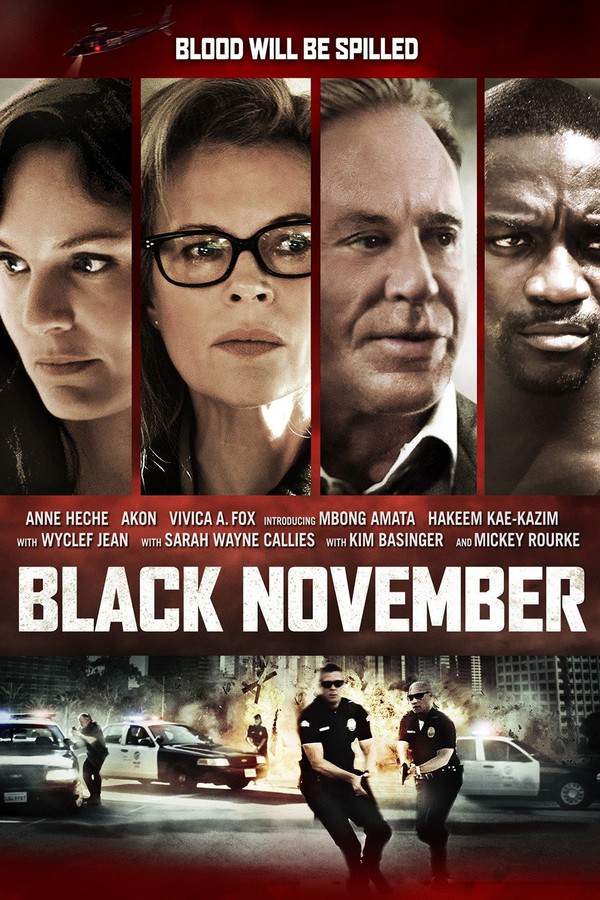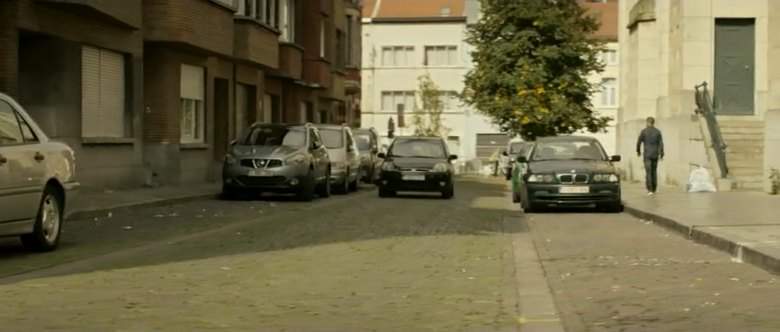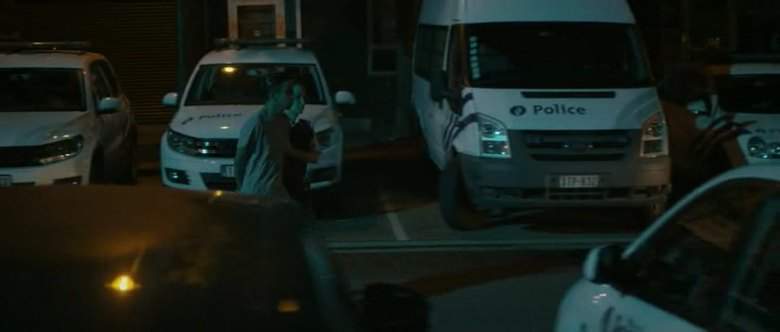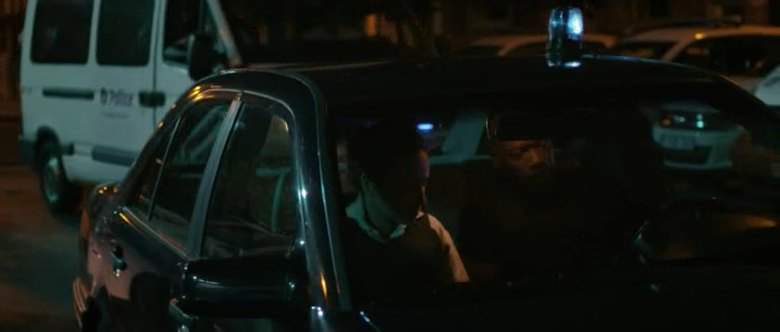Black November 2015

Amidst Nigeria’s oil-rich landscape, a community rebels against government corruption and the exploitative practices of a powerful corporation. When a ruthless rebel group kidnaps an American oil executive, they aim to expose years of environmental devastation and demand accountability. Inspired by true events, the film explores themes of resistance, justice, and the fight for survival against overwhelming oppression.
Does Black November have end credit scenes?
No!
Black November does not have end credit scenes. You can leave when the credits roll.
Meet the Full Cast and Actors of Black November
Explore the complete cast of Black November, including both lead and supporting actors. Learn who plays each character, discover their past roles and achievements, and find out what makes this ensemble cast stand out in the world of film and television.
No actors found
External Links and Streaming Options
Discover where to watch Black November online, including streaming platforms, rental options, and official sources. Compare reviews, ratings, and in-depth movie information across sites like Wikipedia, Rotten Tomatoes, Metacritic or Movie Insider.
Ratings and Reviews for Black November
See how Black November is rated across major platforms like IMDb, Metacritic, and TMDb. Compare audience scores and critic reviews to understand where Black November stands among top-rated movies in its genre.

31
Metascore
tbd
User Score


25%
TOMATOMETER

38%
User Score

3.33/5
From 3 fan ratings
Take the Ultimate Black November Movie Quiz
Challenge your knowledge of Black November with this fun and interactive movie quiz. Test yourself on key plot points, iconic characters, hidden details, and memorable moments to see how well you really know the film.
Black November Quiz: Test your knowledge on the themes and events of the 2015 film Black November.
Where does the film Black November start?
Warri prison
Los Angeles airport
Niger Delta village
Western Oil headquarters
Show hint
Full Plot Summary and Ending Explained for Black November
Read the complete plot summary of Black November, including all major events, twists, and the full ending explained in detail. Explore key characters, themes, hidden meanings, and everything you need to understand the story from beginning to end.
The film embarks on a haunting journey that starts in a grim Warri prison, where Ebiere (Mbong Amata) faces the harrowing threat of execution as a noose is carefully fashioned for her. The narrative swiftly transitions to sunny Los Angeles, California, where Tom Hudson (Mickey Rourke), the unsuspecting CEO of Western Oil, is yanked away from his mundane life by a meticulously planned kidnapping, orchestrated by the mysterious group known as the “United People’s Front for the Emancipation of the Niger Delta People of Nigeria.” The charismatic leader Tamuno (Enyinna Nwigwe), alongside his associates, including Timi (Wyclef Jean), Opuwei (Akon), and Pere (Robert Peters), concoct a clever scheme to snatch Tom while he’s en route to the airport. In a twist of fate, Kristy (Kim Basinger), a savvy reporter covering a nearby accident, becomes entangled in the chaos along with her cameraman.
As the situation escalates, Tom Hudson, his wife (Kristin Peterson), and Kristy, along with several innocent bystanders, find themselves trapped in a now-sealed tunnel. The atmosphere grows heavy with tension as a seven-hour standoff unfolds, leaving the police, anti-terrorism units, and a tense public in the dark about the identity and motivations of their captors.
Within the gloom of the tunnel, Tamuno shares with Tom the true purpose of their actions: to save Ebiere, whose life is precariously at risk. He resolutely declares that if Ebiere is executed in Nigeria, those responsible for the injustices should also face their due consequences. In an unpredictable turn, Tamuno permits the women and children to leave the hostage situation, tasking Kristy with documenting the unfolding crisis.
As we delve deeper into the tale, Tamuno unfolds a poignant history of resilience and courage to Kristy’s camera. The narrative takes us back 21 years to a time marked by harsh military governance in Warri, where Ebiere was born. This bright and ambitious scholar, recently graduated from secondary school, received an esteemed scholarship from Western Oil for higher education abroad, but fate had other designs for her.
Fast-forward to the catastrophic oil pipeline rupture in the Niger Delta, which releases a toxic flood that devastates the coastal territory and endangers the community’s survival. Dede (Hakeem Kae-Kazim), a humble fisherman, is one of the first to experience the detrimental fallout of this environmental catastrophe. As villagers rush to salvage what they can from the spill, authorities arrive to enforce an evacuation. Yet the villagers’ courage and resolve clash with the forces of intimidation, escalating tensions to a boiling point.
Upon returning home, Ebiere is crushed to discover the catastrophic fate that has befallen her family, claiming that her mother and siblings perished in an explosion that turned out to be ignited by a carelessly discarded cigarette from a police officer. As Ebiere finds her voice against the systemic injustices plaguing her community, she meets Kate Summers (Sarah Wayne Callies), a journalist touched by Ebiere’s impassioned crusade for justice. This unlikely duo forms a powerful alliance, with Kate swiftly becoming one of Ebiere’s most fervent advocates.
The duo’s campaign for peaceful protests and rallies resonates throughout the community, as Ebiere boldly insists on their right to be heard amidst the storm of oppression. However, the tragic reality of coordinated military brutality looms large, wherein she and many others experience harrowing violence, including beatings and arrests, targeting those who dare to resist. Temptations of bribes from Western Oil’s agents are thrown in her direction time and again, yet Ebiere shines through in her refusal to succumb to corruption, standing strong against exploitation.
With tragedy still fresh on their minds, Dede—a man profoundly impacted by the loss of his wife and child—reinforces his belief that change can only be achieved through forceful action against a government he views as indifferent to the plight of its people. The tipping point arrives when the military perpetrates an unthinkable invasion, marked by atrocities such as the assault of innocent women, witnessed by traumatized citizens, including Tamuno. Diverging from Ebiere’s nonviolent principles, he joins Dede in their militant march towards a cause they deem just.
Yet, as desperation reigns and violence escalates, Western Oil intervenes under the guise of initiating dialogue between Dede’s faction and the government, a scheme culminating in violence, leading to Dede and his followers facing bloody arrests. Ebiere’s commitment to justice faces even further trials as Chief Gadibia (Isaac Yongo), a corrupt leader, undergoes an unexpected change of heart. However, the elders, fearing the loss of their corrupted throne, conspire against him, resulting in his untimely demise.
Peter (OC Ukeje), Gadibia’s son, horrified by the events, expresses that his father was murdered by that very cabal. When the ill-gained wealth is uncovered, the furious community, led by Ebiere, chooses to administer their own justice rather than surrender to the authorities, burning the elders alive. In a twist of fate, Ebiere bravely takes ownership of the unrest, resulting in her own conviction and death sentence.
In a bid to save her, Tom Hudson frantically contacts Nigeria’s Head of State from within a Los Angeles tunnel, imploring him to intervene on Ebiere’s behalf—a plea that is sadly ignored. Angela (Vivica Fox), a U.S. anti-terrorism unit member, suggests diplomatic action, but her superiors dismiss any engagement with what they label as “terrorists.” The film’s trajectory leads to a disingenuous press release, claiming Ebiere’s release, a façade that brings about the release of hostages, including Tom Hudson. Yet, despite this mere illusion of safety, Ebiere holds on to her principles, ultimately facing her fate on the gallows in Nigeria, while chaos continues to unfold in a world that seems blind to the plight of its people.
Uncover the Details: Timeline, Characters, Themes, and Beyond!

Coming soon on iOS and Android
The Plot Explained Mobile App
From blockbusters to hidden gems — dive into movie stories anytime, anywhere. Save your favorites, discover plots faster, and never miss a twist again.
Sign up to be the first to know when we launch. Your email stays private — always.
Discover Film Music Concerts Near You – Live Orchestras Performing Iconic Movie Soundtracks
Immerse yourself in the magic of cinema with live orchestral performances of your favorite film scores. From sweeping Hollywood blockbusters and animated classics to epic fantasy soundtracks, our curated listings connect you to upcoming film music events worldwide.
Explore concert film screenings paired with full orchestra concerts, read detailed event information, and secure your tickets for unforgettable evenings celebrating legendary composers like John Williams, Hans Zimmer, and more.


Cars Featured in Black November
Explore all cars featured in Black November, including their makes, models, scenes they appear in, and their significance to the plot. A must-read for car enthusiasts and movie buffs alike.

Unlock the World of Movies with Our Comprehensive Wiki
Dive into our Movie Wiki for in-depth film encyclopedia entries, including cast biographies, production trivia, plot synopses, behind-the-scenes facts, and thematic analyses. Whether you’re researching iconic directors, exploring genre histories, or discovering hidden easter eggs, our expertly curated movie database has everything you need to fuel your cinematic passion.

Quick Links: Summary, Cast, Ratings, More

What's After the Movie?
Not sure whether to stay after the credits? Find out!
Explore Our Movie Platform
New Movie Releases (2026)
Famous Movie Actors
Top Film Production Studios
Movie Plot Summaries & Endings
Major Movie Awards & Winners
Best Concert Films & Music Documentaries
Movie Collections and Curated Lists
© 2026 What's After the Movie. All rights reserved.






















